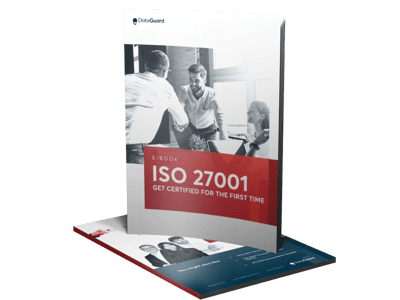From pharmaceutical R&D information to sensitive patient data, healthcare companies handle some of the most valuable information in the world. As a result, healthcare companies need to implement strong information security measures to protect this information from unauthorised access and other cyber threats.
As a healthcare provider, how can you ensure the security of your customers’ sensitive information and your own?
Here is where ISO 27001, an international standard for information security, comes into play. Complying with the standard helps healthcare companies set up a robust system to manage their information (ISMS) in a way that meets industry best practices and regulatory requirements.
We’ve put together this guide to help you learn what ISO 27001 standard is, why it is crucial for healthcare companies, what the requirements are for ISO 27001, how you can implement ISO 27001, and more.
Content Overview
- What is the ISO 27001 standard?
- Why is ISO 27001 important for healthcare companies?
- How can ISO 27001 protect healthcare companies?
- What are the benefits of getting the ISO 27001 certification?
- What are the ISO 27001 requirements for a healthcare company?
- How can you implement ISO 27001 standard in your healthcare company?
- How can you get ISO 27001 certified?
- How can DataGuard help healthcare companies get certified?
What is the ISO 27001 standard?
- To put it simply, ISO 27001 is an international information security standard that helps companies like yours manage sensitive information.
- The standard provides a blueprint of policies, procedures, and controls to help you set up an effective information security management system (ISMS). As a part of the standard, companies regularly identify, analyse, and evaluate weaknesses in their systems. This process is referred to as a “risk assessment”.
- You also have the option to get ISO 27001 certified. The ISO 27001 certification is done by an independent certifying body that approves of how you’ve put together your ISMS in line with the standard. Getting the ISO 27001 certification is an internationally accepted seal of approval that can help assure your stakeholders that you take the safety of their information seriously.
Keeping these terms in mind, let’s go over why it is paramount that you comply with ISO 27001 as a healthcare company.
Why is ISO 27001 important for healthcare companies?
Healthcare companies handle sensitive patient information daily, and a breach of this information could have severe consequences for the company and the individuals whose data has been compromised.
As a result, healthcare companies have to deal with multiple cybersecurity threats. These include:
- Ransomware attacks
An increasing number of healthcare companies are dealing with ransomware attacks where bad actors hold hospital data hostage and force them to pay massive ransom to recover it. With healthcare being the most likely sector to pay the ransom, they’ve become highly lucrative targets for hackers. - Attacks on medical devices
Healthcare providers are quickly adopting the internet of things (IoT), where medical devices and software exchange information over the internet. While IoT helps hospitals streamline operations, unmanaged devices can give attackers more vulnerabilities to exploit and gain access to sensitive data. - BEC attacks
Business Email Compromise (BEC) attacks often take the form of phishing and social engineering, where the attacker poses as someone legitimate to trick the user into giving them access. With over 95% of data breaches resulting from human error, this technique has proven to be very effective for hackers in accessing sensitive information.
In today’s healthcare industry, cyber threats are on the rise. In fact, security breaches are becoming more prevalent than ever before. In fact, according to a recent survey, 89% of the surveyed organizations experienced an average of 43 attacks over the past year – averaging almost an attack each week.
That’s why implementing an ISO 27001-compliant information security management system can help you protect your company.
How can ISO 27001 protect healthcare companies?
ISO 27001 protects healthcare companies in multiple ways.
- A blueprint of policies and procedures
An ISMS built according to ISO 27001 helps healthcare companies clearly state their policies and procedures for how they manage information. Ensuring proper policies can help prevent data breaches. - Analyse gaps in your information security
By integrating an ISO 27001-compliant ISMS in your company, you can easily identify any gaps in your information security and test your existing security measures (penetration testing). - Reduce supply chain risks
The ISO 27001 standard doesn’t only protect you from external threats; it also helps to reduce supply chain risks. The standard helps you integrate information security elements into your supplier contracts and minimise risks. - Ensure staff is well equipped to handle cyber threats
By complying with the ISO 27001 standard, you can ensure your staff are well trained in identifying and dealing with phishing, password attacks and social engineering.
- Identify and prepare for a variety of security risks
With the ISO 27001 standard, you can identify the different types of information assets and their unique risks. Once you know what these risks are, you can formulate strategies to deal with them effectively.
- Help with legal compliance
Healthcare is one of the most heavily regulated industries in the world because of the sensitivity of the information handled. Stringent laws such as GDPR and HIPAA have strict requirements for how companies should handle health data. Implementing ISO 27001 standard can help you in complying with the lawful requirements.
What are the benefits of getting the ISO 27001 certification?
- Assuring customers about the security of their data
Your ISO 27001 certification will give your customers peace of mind about your commitment to their data’s security. With several high-profile security incidents in the healthcare industry, potential customers could possibly having concerns about the safety of their data. By getting ISO 27001 certified, you can show them that you have invested in protecting their data by implementing an information security management system. - Gaining a competitive edge in the industry
Getting ISO 27001 certified can help you build trust and improve your reputation in your industry. Since some companies only choose to do business with ISO 27001-certified companies to avoid risks, the certification can give you an edge over your competitors. - Getting an independent review of your information security
A third-party institution issues ISO 27001 certification after extensive audits. These independent audits can help you identify issues you may have missed and can ensure your system is in good shape.
Now that you know how ISO 27001 can protect your company, let’s take a closer look at the requirements you need to meet if you plan to comply with ISO 27001.
What are the ISO 27001 requirements for healthcare companies?
Understanding the requirements of ISO 27001 can help you take the first step in implementing it for your healthcare company. Clauses 4-10 of the standard list the requirements for setting up an ISO 27001 compliant ISMS:
- Clause 4: Context of the Organization
You need to define what you want to do by setting up your ISMS. Here, you’ll determine areas of your company that will be protected by the ISMS and outline the information assets that’ll be governed by it.
- Clause 5: Leadership
Management support is a must for the success of your ISMS. You have to set up the company’s information security policy and form a team of people responsible for your company’s ISO 27001 compliance efforts.
- Clause 6: Planning
A robust information security plan is crucial to set up your ISMS successfully. This means conducting a thorough risk assessment to identify your risks as a healthcare company and decide on the strategies to mitigate them.
- Clause 7: Support
Your compliance efforts can only be successful if your compliance team is supported with enough resources. They should also be well-versed in how ISO 27001 works and understand your security goals.
- Clause 8: Operation
Now it’s time to put your ISMS in place. Once it is up and running, you are expected to conduct regular risk assessments to identify and prevent any weak spots in your information security system.
- Clause 9: Performance evaluation
To ensure your processes and controls are performing as you intended, you are expected to monitor, measure, analyse and evaluate your ISMS constantly. An internal audit can help you with this task.
- Clause 10: Improvement
Your ISO 27001 compliance is a continuous process. As a healthcare company, you must regularly update and improve your ISMS to keep up with the current information security landscape.
Learn more about the requirements of ISO 27001 in detail here.
Meeting these requirements is essential to complying with the ISO 27001 standard and is the first step towards implementing the standard in your company.
How can you implement ISO 27001 standard in your healthcare company?
Implementing the ISO 27001 standard for your company can have several phases. We’ve broken them down into brief sections for you.
- Assemble your team
Having a dedicated team to drive ISO 27001 compliance is crucial for the success of your compliance efforts. The team will be headed by the project manager, who’ll assemble the rest of the team members. This will ensure your team has the right mix of skills to make the implementation successful.
- Draft Statement of Applicability (SoA)
Once you’ve assembled your team, you must define the scope of application of the ISO 27001 standard in your company. Will your ISMS cover the entire company or only a particular segment?
Once you’ve decided on your scope, you can identify your goals for enacting an ISO 27001-compliant ISMS and how you can achieve them. This will help you decide on your policies for specific issues such as access management and mobile devices.
- Conduct risk assessment
Conducting the risk assessment can be the most complex part of your compliance journey. You will need to identify the level of risk you are willing to tolerate as a healthcare company and your current risk level.
Risks are analysed based on their impact on your healthcare company and their likelihood of occurrence. Once you’ve defined your risks and risk tolerance, you can create your Risk Treatment Plan (RTP).
To conduct a successful risk assessment, consider the following steps:
Step 1: Set up an ISO 27001 risk assessment framework and outline the guidelines for how your healthcare company will conduct the risk assessment. That means deciding on several elements of your risk assessment, including the type of assessment, security criteria for evaluation, and risk tolerance level.
Step 2: List your company’s information assets to conduct an asset-based risk assessment. At this step, you will focus on your information assets and the risks they may face.
Step 3: Identify risks by determining the threats to your information assets and their likelihood of occurrence. This will help you calculate your risk level.
Step 4: Evaluate risk impact by ranking your risks according to their likelihood and the damage they can inflict. Doing this can help you determine which risks require immediate attention and which can be treated later.
Step 5: Update your SoA with the results of your risk assessment. Record the risks and the controls you’ve put in place, along with your justification.
Step 6: Formulate a Risk Treatment Plan (RTP) and allocate owners to each risk. Risk owners are responsible for approving risk mitigation strategies and accepting residual risks.
Step 7: Regularly review and assess your company’s information security practices to ensure they are effective and up-to-date. Repeating the assessment annually can help you with this.
- Put processes and controls in place
After you become familiar with the risks, it is time to set up processes and controls to deal with them. These can include employee training programmes to reduce human error, specific risk mitigation measures, and mandatory procedures required by law.
- Measure, monitor and review
The integration of ISO 27001 standards doesn’t end after you’ve got your Information Security Management System (ISMS) up and running.
Develop an effective process to review your ISMS annually to ensure your ISMS is achieving your information security objectives.
- Attain certification
The final step is to pursue certification through an external audit by an independent certifying body. Let’s see how you can do that.
How can you get ISO 27001 certified?
Once you are confident in your ISMS, you can commit to an audit by an independent, accredited certification body. There are several accredited certification bodies for ISO 27001 in the UK that UKAS, the national accreditation body for the UK, has approved.
Here’s a list of currently accredited bodies for you to choose from.
An external auditor conducts the audit to gain the ISO 27001 certification in two stages.
- Stage 1 - The auditor will review your documentation to ensure you have developed your ISMS in line with the ISO 27001 standard.
- Stage 2 - If the auditor is satisfied with your documents, they’ll move on to a comprehensive assessment of your ISMS’s capabilities. It can include on-site visits, interviews with your ISO 27001 compliance team and other staff, and a review to see how your ISMS responds to practical scenarios.
Once you pass, you’ll be issued your ISO 27001 certification. Something to keep in mind is that you’ll be charged for the entire audit even if you fail at stage 1. So, it is essential to have thoroughly assess and improve your ISMS internally before committing to an external audit.
How can DataGuard help healthcare companies get certified?
Complying with the ISO 27001 standard, especially in a heavily regulated industry like healthcare, can seem daunting. Whether you are looking to comply with ISO 27001 for the first time or seeking to improve your current information security management system (ISMS), DataGuard is here to help.
- Work with in-house experts
100% of our customers pass their certification on their first try. Our in-house experts will guide you every step of the way and provide thorough explanations to your questions.
- Customized solutions for your specific needs as a healthcare company
No two companies are the same. Our experts will work with you to understand your unique needs as a healthcare company and develop a tailor-fit solution so you can choose what’s best for your company.
- Our Info-Sec platform will become your living ISMS
Our easy-to-use Info-Sec platform will help you keep track of all your documents and assets in one place. Designed to make compliance accessible, anyone can use our platform with ease with no complex setups required. Using the platform, track your assets, documents, risks and audits all in one place and automatically generate mandatory policies.
Interested in getting ISO 27001 certified? Book a free consultation today.
FAQs
Where do I start with ISO 27001?
There are six steps to ISO 27001 implementation.
- Assemble your team
- Draft Statement of Applicability (SoA)
- Conduct risk assessment
- Put processes and controls in place
- Measure, monitor and review
- Attain certification
To learn more about implementing ISO 27001 in your company, check out the ISO 27001 implementation roadmap.
Is ISO 27001 HIPAA compliant?
While compliance with ISO 27001 can certainly help you set up some controls required by HIPAA, it doesn’t cover all of HIPAA’s requirements, such as privacy-related controls.
Does ISO 27001 help with UK GDPR compliance?
Achieving the ISO 27001 standard can help you get started with aspects of your UK GDPR compliance as well. You can learn more about complying with UK GDPR as a healthcare provider here.


SO 27001 - Get Certified For The First Time
This guide will tell you everything you need to know about ISO 27001, what it can do for your organisation, and how you go about getting it.
Download Now





